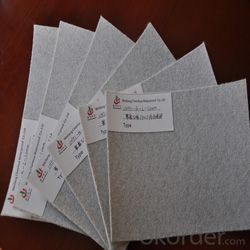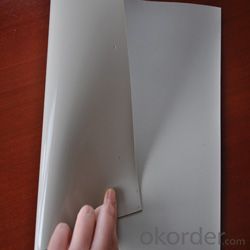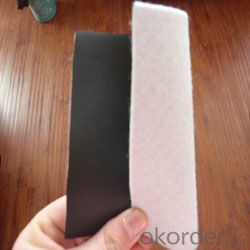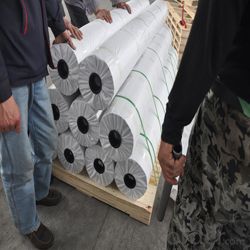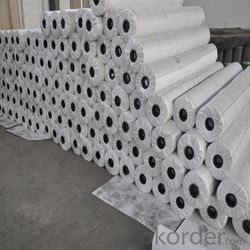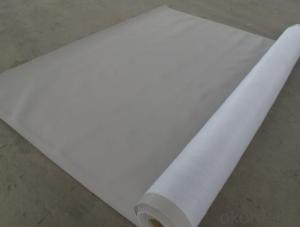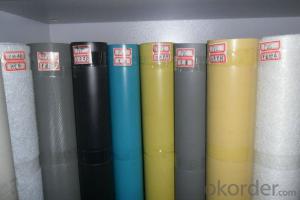PVC waterproof membrane
- Loading Port:
- Qingdao
- Payment Terms:
- TT OR LC
- Min Order Qty:
- -
- Supply Capability:
- 100000 m²/month
OKorder Service Pledge
OKorder Financial Service
You Might Also Like
PVC (polyvinyl chloride) roof membrane
is an excellent high quality polymer waterproof sheet, made of PVC resin by adding plasticizer,
anti-UV agent, anti aging agent, and stabilizer and other processing aids through extrusion
and molding.As the highly recommended product by the Ministry of Construction, it is featured by high tensile
strength, great elongation, good stability, small shrinkage, low temperature performances, good resistance to
weathering and root penetration, and long service life.
Physical Property:
1.Good combination of high elasticity and tensile strength.
2.Fine resistance to static electricity.
3.Excellent resistance to ageing / weathering.
4.Durable,the effective age can be more than 20 years used on exposed surfaces,used on non-exposed surfaces,it can reach 50 years.
5.Fine flexibility at low temperature,adaptable to cold conditions.
6.Root-resistance,can be used on the planting roofs.
7.Fine puncture resistance, joint peel strength and joint shear strength.
8.Fine UV-resistance,no pollution to environment.
9.Easily welding,installing,secure.
10.Easy treatments to the delicate parts of corners and edges.
11.Convenient maintenance with low cost.
Polyvinyl Chloride (PVC) membrane with fiber reinforced layer
on the back is widely used in the roofs of civil buildings,
tunnels, channels, subways, highways, planting roofs, the roofs of steel
frame structure buildings, and etc.
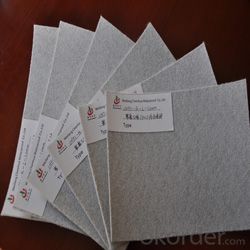
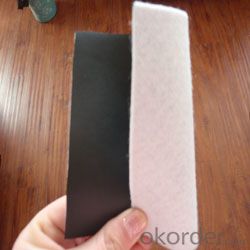
- Q: Can waterproofing membranes be used on retaining walls?
- Retaining walls can indeed benefit from the application of waterproofing membranes. It is quite common to utilize these membranes on retaining walls in order to hinder the infiltration of water and safeguard the structure against issues arising from moisture, such as seepage, efflorescence, and cracking. These membranes act as a barrier, effectively preventing water from permeating the retaining wall and causing harm. Typically, they are installed on the exterior side of the retaining wall, providing an added layer of protection against water intrusion. There is a wide range of waterproofing membranes available, including sheet membranes, liquid-applied membranes, and cementitious coatings, allowing for the selection of the most suitable option based on the specific requirements and demands of the retaining wall.
- Q: Can a waterproofing membrane be used for roofs with foot traffic?
- Indeed, it is possible to utilize a waterproofing membrane for roofs that experience foot traffic. Nevertheless, it is imperative to select a membrane that is specifically engineered and classified for foot traffic. Usually, these membranes incorporate sturdier materials like reinforced PVC or modified bitumen, enabling them to endure the constant wear and tear resulting from regular foot traffic. Moreover, it is of utmost importance to guarantee the proper installation and maintenance of the membrane, so as to avert any potential harm or leakage that may undermine its waterproofing capacity. Consistent inspections and essential repairs must be conducted to guarantee the long-lasting and efficient performance of the membrane.
- Q: Does a waterproofing membrane prevent water infiltration through concrete or other building materials?
- Indeed, the primary purpose of a waterproofing membrane is to thwart the ingress of water into concrete or other construction materials. It serves as a safeguarding shield that is administered onto the material's surface, creating a layer impervious to water. The composition of this membrane can vary, encompassing substances like bitumen, rubberized asphalt, or liquid polymers. Once installed with precision, it effectively averts water infiltration, thereby safeguarding the edifice against potential water-induced harm or moisture-related predicaments.
- Q: Can waterproofing membranes be used on both horizontal and vertical surfaces?
- Yes, waterproofing membranes can be used on both horizontal and vertical surfaces.
- Q: Can a waterproofing membrane be used on adobe block surfaces?
- Indeed, adobe block surfaces can be treated with a waterproofing membrane. These blocks, composed of a blend of clay, sand, and straw, are prone to water damage. By applying a waterproofing membrane, the infiltration of water can be prevented, thus safeguarding the adobe blocks against various moisture-related problems like cracking, erosion, or mold formation. It is essential to verify that the waterproofing membrane is suitable for adobe surfaces and adhere to the manufacturer's instructions for application. Furthermore, prior to applying the membrane, it is vital to adequately prepare the surface and address any preexisting damages to ensure optimal performance.
- Q: Can waterproofing membranes be applied in cold weather?
- Yes, waterproofing membranes can be applied in cold weather. However, it is important to ensure that the manufacturer's instructions are followed regarding temperature limitations and proper installation techniques. Cold weather may affect the curing and adhesion process, so additional precautions and proper heating or insulation methods may be necessary during the application.
- Q: What is the cost of a waterproofing membrane?
- The cost of a waterproofing membrane can vary depending on factors such as the type and quality of the membrane, the size of the area to be covered, and the complexity of the installation. It is best to consult with manufacturers or contractors to get accurate cost estimates for specific projects.
- Q: Can a waterproofing membrane be used on tunnels with soundproofing systems?
- Yes, a waterproofing membrane can be used on tunnels with soundproofing systems. In fact, it is common practice to use waterproofing membranes in conjunction with soundproofing systems in tunnels. This is because tunnels are susceptible to water infiltration, which can cause damage to the structure, as well as compromise the performance of the soundproofing system. By applying a waterproofing membrane, the tunnel can be protected from water intrusion, ensuring the longevity and effectiveness of the soundproofing system. Additionally, the waterproofing membrane can help to maintain a dry and comfortable environment within the tunnel, which is crucial for the efficient functioning of the soundproofing system. Therefore, the combination of a waterproofing membrane and soundproofing system is highly recommended for tunnels to provide both water protection and sound insulation.
- Q: Can a waterproofing membrane be applied in wet conditions?
- Yes, a waterproofing membrane can be applied in wet conditions. However, it is important to ensure that the surface is clean, dry, and free of any standing water or moisture before applying the membrane. Additionally, certain types of waterproofing membranes may have specific instructions or recommendations for application in wet conditions, so it is advisable to consult the manufacturer's guidelines for best results.
- Q: Can a waterproofing membrane be used in basements?
- Yes, a waterproofing membrane can be used in basements. Waterproofing membranes are commonly used in basements to prevent water infiltration and protect against moisture damage. These membranes are applied to the basement walls and floors to create a barrier that keeps water out, helping to keep the basement dry and prevent issues such as mold and mildew.
Send your message to us
PVC waterproof membrane
- Loading Port:
- Qingdao
- Payment Terms:
- TT OR LC
- Min Order Qty:
- -
- Supply Capability:
- 100000 m²/month
OKorder Service Pledge
OKorder Financial Service
Similar products
Hot products
Hot Searches
Related keywords







